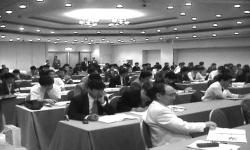| Volume VIII Number 2 Page 2 |
1998
|
| INDEX [HOME] |
|---|
|
Persistent Stored Modules Usage A central new feature of the Empress RDBMS V8.10 is Persistent Stored Modules (PSM). PSM allows users to store user- defined functions, operators, stored procedures and triggers in the database, as an object in a schema which can then be invoked from an SQL statement and application programming. (Empress User Defined Functions Manual). There are several reasons why a PSM should be used: 1) It can improve performance, 2) It can be used as an element of the object repository in the database (as a structuring device for the application programming), 3) It can extend the functionality of the RDBMS to meet customer specific requirements. The following is an example of PSM usage showing a stored procedure as a PSM. STORED PROCEDURE PSM Tables in a PSM can be created using the Empress function mscall() (described in Empress Command Language Interface, Manual B1, Chapter 4). For example, create the following source C program: cat createtab.c
You can create a script file (e.g. createtab.sh) with all the relevant calls needed to create a PSM and store it in the database "dd": cat createtab.sh
You can invoke a newly created PSM "createtab", in the Interactive SQL session: empsql dd
Note: There are different variations to do this task, but this example gives a basic idea on how to do it. More examples of Persistent Stored Modules usage are available. Contact your Empress representative or request this information from support@empress.com. |
 Lynx User's Group Japan meeting held in Yokohama, Japan Real-Time Software Development In the fast paced arena of real-time software development, the exchange of information is essential to success and continued partnership of real-time developers. Technology leaders from around the world met last month at the Lynx User's Group Japan (LUG '98) meeting held in Yokohama, Japan. The focus of the mutually beneficial information exchange centered around the future of real-time software development, and the usage and development of Lynx products including LynxOS/Ver3.0.
The technical session topics included strides in distributed-object technology, applications in telecommunications and industrial control, Empress RDBMS V8.10, Real-Time CORBA, Lynx OS technical advances, and future technology. Among those invited were representatives from Empress Software, Lockheed Martin, Mitsubishi, Sony and Toyota. 
SMI, continue from page 1 Via the use of Java servlets, SMI's application, called metAP (Meterologisher Arbeitsplatz), will provide areas in Switzerland with up-to-date information. Currently, the application is operational with a file system base. It will be ready for employment with the Empress JDBC Interface upon the completion of final testing. "We believe that the fast access to Empress databases that the Empress JDBC Interface provides will consistently deliver data within the customer's time-sensitive windows," states Christian Pauli, Project Manager at SMI. "We could not hope to achieve such speed before the implementation of Empress's JDBC Interface." MetAP handles tables, simple maps and charts of data gathered from meteorological networks consisting of a hundred stations. Seventy weather parameters such as temperature and precipitation figures are gathered and updated in 10 minute intervals. The sets of data delivered to a specific end-user have to be tailor-made according to factors such as region and time. With this information, forecasters can create forecasts from chosen criteria. But most importantly, they are assured of receiving the information they want when they need it. For more information about metAP or SMI, call +41-91-756-23-16 or write to pau@maz.sma.ch.
|
For information on the products or companies covered in this newsletter, please contact Empress Software by telephone, fax, or e-mail, using any of the numbers listed below:
|
Empress Software Inc. 6401 Golden Triangle Drive Greenbelt, Maryland USA 20770 Tel: (301) 220-1919 Fax: (301) 220-1997 E-mail: sales@empress.com |
Empress Software Inc. 3100 Steeles Avenue East Markham, Ontario Canada L3R 8T3 Tel: (905) 513-8888 Fax: (905) 513-1668 E-mail: sales@empress.com |